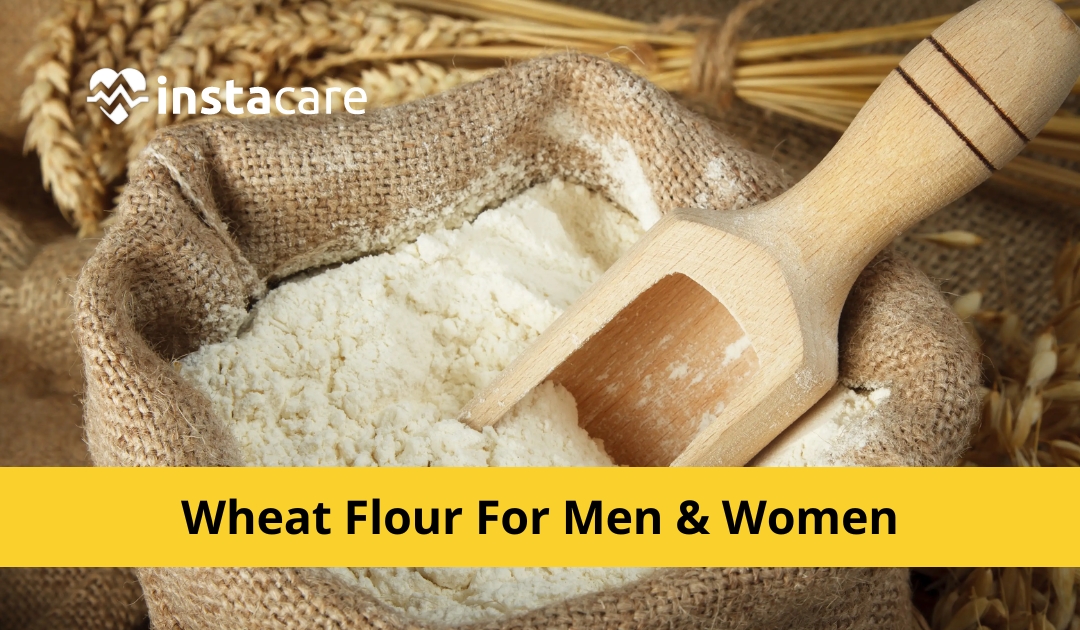Do you want to enjoy a healthier diet that can satisfy your
nutritional needs and improve your overall health? Then look no further than
wheat flour! This wholesome food product is packed with a variety of essential
nutrients, vitamins, minerals and more. Wheat flour has sustained multiple
cultures for centuries due to its numerous health benefits, including improved
immunity, bone strength and gut health. Not only that, this powerhouse
ingredient can be used in both savory and sweet recipes alike - making it an
easy addition to any meal plan. Learn about the surprising benefits of wheat
flour for men, women and health lovers today!
What is wheat flour?
Wheat flour is a type of flour that is produced by milling wheat grains. It is mainly used for baking purposes and is a key ingredient in numerous popular foods such as bread, pastries, cakes, and biscuits. Wheat flour comes in different varieties, including enriched, unbleached, wholemeal, and self-raising, with each variety being suited to different types of recipes.
Enriched wheat flour is fortified with iron and b vitamins, while unbleached
wheat flour is not treated with chemicals to whiten it. Wholemeal flour
contains the entire wheat kernel, while self-raising flour has leavening agents
added to it. Wheat flour is an essential ingredient in the culinary world and
is a staple in many households worldwide.
Nutrition value of wheat flour
Wheat flour is a pantry staple that you might find in most households. It is used to make various baked goods like bread, cakes, and pastries. Besides being a versatile ingredient, wheat flour is also packed with essential nutrients. It is an excellent source of complex carbohydrates, which provide sustained energy throughout the day. Wheat flour contains high levels of fiber, which helps in digestion and keeps you fuller for longer.
It also
contains important minerals like iron and magnesium, which are essential for
healthy bones and proper cell functioning. To maximize the nutrition value of
wheat flour, opt for whole-grain varieties instead of refined flour that has
been stripped of its beneficial nutrients. Incorporating wheat flour into your
daily diet can provide you with the energy and nutrients your body needs to
stay healthy and strong.
Different types of wheat flour
Wheat flour is an essential ingredient in many of our daily meals, but did you know that there are several types of wheat flour available? Each type has a distinct composition and texture, leading to various outcomes in baked goods. Some of the most common types include all-purpose flour, whole wheat flour, cake flour, bread flour, and pastry flour. All-purpose flour is a versatile type of flour that can be used in various recipes and usually has a protein content of around 10-12%. Whole wheat flour, on the other hand, is unrefined and contains more fiber and nutrients.
Cake flour contains less
protein and has a finer texture, making it ideal for delicate baked goods like
cakes and pastries. Bread flour is high in protein and is best for yeast bread,
while pastry flour has a low protein content and is perfect for making pie
crusts and other delicate baked goods. Next time you're in the baking aisle,
take a closer look at the different types of wheat flour available and
experiment to see how they affect the outcome of your favorite recipes.
Wheat flour benefits
1- Wheat flour benefits for skin and hair
Wheat flour, a common ingredient found in every kitchen, is not only beneficial for preparing delicious meals but also for skin and hair. Rich in various nutrients, wheat flour works wonders in nourishing and hydrating the skin. It acts as a natural exfoliator, leaving the skin soft, supple and radiant. Wheat flour also helps in reducing dark circles and premature signs of aging. When it comes to hair, wheat flour acts as a hair strengthening agent, preventing hair breakage and promoting hair growth.
It
also helps in reducing dandruff and adds volume to hair. With its many
benefits, it's no wonder that wheat flour has become a popular ingredient in
many beauty treatments and home remedies. So, the next time you're in the
kitchen, remember that wheat flour is not just for cooking but also for
enhancing your skin and hair health.
2- Aids digestion
Digestion is a vital process in the body that processes the food we eat and extracts the nutrients we need for energy and growth. If we don't digest our food properly, it can lead to a range of uncomfortable symptoms, including bloating, gas, and constipation. One way to promote healthy digestion is by incorporating foods that aid the digestive process. These include fiber-rich foods like fruits, vegetables, and whole grains, which can help keep things moving in the digestive tract.
Additionally, fermented foods
like yogurt and kimchi contain helpful bacteria that can improve gut health.
Drinking plenty of water and chewing your food thoroughly also play important
roles in promoting healthy digestion. By making a few simple dietary changes
and adopting healthy habits, it's possible to support your digestive system and
reduce uncomfortable digestive symptoms.
3- Contains protein
Protein is an essential nutrient that plays a vital role in
the human body's growth, maintenance, and repair. It is made up of amino acids
that serve as the building blocks of various tissues and organs, including
muscles, skin, and hair. Foods that are high in protein include meat, poultry,
fish, eggs, dairy, legumes, and nuts. Consuming an adequate amount of protein
is crucial for maintaining a healthy diet and supporting a healthy lifestyle.
Whether you're an athlete or simply looking to improve your overall health,
incorporating protein-rich foods into your meals can help you achieve your
goals.
4- Prevents weight gain
Maintaining a healthy weight can be quite a challenge. Thankfully, there are simple lifestyle changes you can make to prevent unwanted weight gain. Firstly, it's important to stay active. Whether it's taking a walk during your lunch break or hitting the gym after work, finding time to exercise is crucial. Also, be mindful of what you eat. Focus on incorporating whole, unprocessed foods into your diet and limit your intake of sugary and high-calorie treats.
Additionally, staying hydrated by drinking plenty of water throughout
the day can help prevent overeating and keep your metabolism functioning
optimally. By taking small steps towards a healthier lifestyle, you can prevent
weight gain and feel better both physically and mentally.
5- High in nutrients and fiber
Having a diet rich in nutrients and fiber is incredibly important for maintaining a healthy lifestyle. Not only do these two components provide essential vitamins and minerals, but they also help regulate digestion and prevent chronic diseases. Nutrient-dense foods, such as whole grains, fruits, and vegetables, provide an array of health benefits, including boosting energy levels and reducing the risk of heart disease and cancer.
Additionally, fiber helps keep the digestive system running smoothly, aiding in the absorption of nutrients and preventing constipation. Incorporating these foods into your diet can have a positive impact on your overall well-being, making it a great choice for anyone looking to improve their health and vitality.
6- Cleanses the system
The concept of cleansing the system has been around for ages, and for good reason. Our bodies are exposed to countless toxins and pollutants every day, from the air we breathe to the food we eat. These toxins can accumulate over time and lead to a range of health problems.
By doing a cleanse, we help our bodies to release some of this toxic burden and restore balance to our systems. There are many different ways to cleanse, from juice fasts to herbal remedies to simply incorporating more detoxifying foods into our diets. Whatever method you choose, it's important to listen to your body and take it slow. Cleansing can be a powerful tool in promoting optimal health, but it's not a quick fix or a one-size-fits-all solution.
7- Reduction in chronic inflammation
Chronic inflammation is a condition where the body's immune system constantly triggers a response, leading to long-term inflammation and tissue damage. It is a common factor in many diseases such as arthritis, heart disease, and diabetes. The good news is that researchers have discovered several effective ways to reduce chronic inflammation, including dietary changes, exercise, and stress reduction techniques.
A diet rich in fruits,
vegetables, and omega-3 fatty acids has been found to have anti-inflammatory
effects. Additionally, regular exercise can decrease inflammation markers in
the body, and practices such as yoga and meditation can help reduce stress,
which has been linked to chronic inflammation. By adopting these lifestyle
changes, individuals can take significant steps towards improving their health
and reducing their risk of chronic disease.
8- Improves mental health
Improving mental health is of utmost importance, as it affects all aspects of our lives - from our relationships to our work performance. It is a well-known fact that taking care of our mental health is just as important as taking care of our physical health. There are many ways to improve our mental health, such as mindfulness meditation, talking to a therapist, getting adequate sleep, exercise, and spending time with loved ones.
When we take the time to prioritize our mental health, we can experience a
range of benefits, including reduced stress levels, increased happiness, and a
greater sense of overall well-being. By making small changes to our daily
routine, we can take steps towards better mental health and a happier,
healthier life.
9- Lowers the risk of heart diseases
Heart disease is a serious condition that affects millions of people worldwide. Fortunately, there are steps you can take to lower your risk. One of the most effective ways to do so is by making healthy lifestyle choices. This includes eating a balanced diet that is low in saturated fat and high in fiber, getting regular physical activity, and not smoking.
By adopting
these habits, you can help to protect your heart and reduce your chances of
developing heart disease. Additionally, managing conditions such as high blood
pressure and diabetes can also lower your risk. It's important to talk to your
healthcare provider about any concerns you have regarding your heart health and
to work together to create a plan that is right for you.
10- Reduces the risk of cancer
Cancer is a disease that has affected many people around the world. It is a devastating illness that can have a significant impact on one's life. There are many causes of cancer, including genetics, lifestyle choices, and environmental factors. However, research has shown that there are measures we can take to reduce the risk of developing cancer.
Adopting a healthy
lifestyle that includes a balanced diet, regular exercise, and avoiding harmful
substances like tobacco and excessive alcohol consumption can help protect
against cancer. Additionally, early detection through routine screenings and
check-ups is also essential. By taking these preventive steps, we can
significantly reduce our risk of developing cancer and improve our overall
health and well-being.
11- Helps in regulation of pms symptoms
Pms, also known as premenstrual syndrome, is a common condition that affects many women every month. Symptoms can range from bloating and cramps to mood swings and depression. Fortunately, there are ways to help regulate these symptoms. Exercise, for example, has been shown to decrease pms symptoms by increasing endorphin levels and reducing stress. A healthy diet with plenty of nutrients and hydration can also make a difference.
Additionally, certain supplements like magnesium and vitamin b6 have been found
to lessen pms symptoms. It's important to remember that everyone's body is
different and what works for one person may not work for another, so it's
important to experiment and find what works best for you.
When wheat is a problem
Wheat is a staple in many diets, but for some people, it can be a major problem. Those with celiac disease or a wheat allergy must avoid wheat in all forms, including products made with wheat flour. Even those without a diagnosed condition may experience discomfort after consuming wheat, due to non-celiac gluten sensitivity.
Symptoms can include bloating, diarrhea,
and fatigue. While there are now numerous gluten-free options available, it's
important to read labels carefully and be aware that wheat is often a hidden
ingredient in processed foods. With proper attention to diet, those with
wheat-related issues can still enjoy a healthy and satisfying diet.
Conclusion
In conclusion, there are many surprising benefits associated with using wheat flour. From its ability to lower cholesterol levels in men and women to its high nutrient content that satisfies the cravings of health lovers, it is clear why wheat flour has become increasingly popular. In addition to positive health effects, it also provides a delicious taste and texture that appeals to a wide range of dietary needs and cooking styles.
Furthermore, baking with whole wheat flour helps reduce food waste by using the
entire grain kernel. For those looking for an easy way to spice up their meals
or improve their overall nutritional intake, switching things up with some
wheat flour is definitely worth considering.











